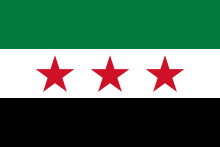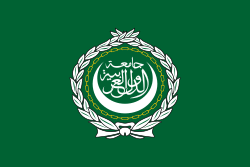Foreign relations of the Syrian Opposition
The foreign relations of Syrian Opposition refers to the external relations of the self-proclaimed oppositional Syrian Arab Republic, which sees itself as the genuine Syria. The region of control of Syrian opposition affiliated groups is not well defined. The Turkish government recognizes Syrian opposition as the genuine Syrian Arab Republic and hosts several of its institutions on its territory. The seat of Syria in the Arab League is reserved for the Syrian opposition since 2014.
 |
|---|
| This article is part of a series on the politics and government of Syrian opposition |
|
Symbols
|
|
Constitution |
|
Executive
|
|
Legislature
|
|
Administrative divisions |
|
Political parties
|
Diplomatic relations of opposition groups
The Syrian Opposition Coalition (SOC) was formed in Doha in November 2012, and declared itself the legitimate representative of the Syrian people, calling on states to recognize it. It was recognized by the six member States (Saudi Arabia, Bahrain, the United Arab Emirates, Oman, Qatar and Kuwait) of the Gulf Cooperation Council (GCC) within a day.[1] The Arab League "urged regional and international organisations to recognise it [SOC] as a legitimate representative for the aspirations of the Syrian people”, and called it “a legitimate representative and a primary negotiator with the Arab League", but did not recognise it as the sole representative of the Syrian people.[2][1] France was the first Western country to give recognition to the SOC on 13 November 2012, followed by Turkey on 15 November.[1] On 19 November, Italy and the European Union's Foreign Ministers stated recognition of the SOC as a (rather than the sole) legitimate representative of the Syrian people.[1][3] Over the following weeks, Britain recognised it as the sole representative,[4] and Germany, Denmark, Norway, the Benelux countries and the US recognised it as "the" legitimate representative.[1] Similar wording was used by the 114 member Friends of Syria group of states in December 2012.[1]
Foreign relations of the Syrian Opposition
Relations with UN member states
The US along with many European allies recognised the Syrian coalition as the legitimate representative of the Syrian people in late 2012.[5][6]




Relations with international organisations



References
- Stefan Talmon Recognition of Opposition Groups as the Legitimate Representative of a People, Chinese Journal of International Law, Volume 12, Issue 2, 1 June 2013, Pages 219–253, https://doi.org/10.1093/chinesejil/jmt014 Published: 05 May 2013
- Arab League gives hesitant welcome to Syria opposition coalition, 13 November 2012 (http://english.ahram.org.eg)
- EU recognises Syrian National Coalition as 'legitimate' representative, France24 2012-11-19
- Citing a ‘Credible Alternative’ to Assad, Britain Recognizes Syrian Rebel Group, New York Times NOV. 20, 2012
- Syrian opposition offices get US diplomatic recognition, The National May 6, 2014
- "Big powers to recognize Syrian opposition". Daily Mirror. 12 December 2012. Retrieved 23 November 2018.
- "New Syrian opposition chief seeks recognition, arms". Antigua Observer Newspaper. Reuters. 13 November 2012. Retrieved 23 November 2018.
- Balci, Bayram (13 April 2012). "Turkey's Relations with the Syrian Opposition". Carnegie Endowment for International Peace. Retrieved 16 February 2019.
- Kalman, Aaron (13 November 2012). "US, France recognize Syrian opposition as 'legitimate representative' of the people". The Times of Israel. Retrieved 17 February 2019.
- Dwyer, Devin; Hughes, Dana (14 December 2012). "Obama Recognizes Syrian Opposition Group". ABC News. Retrieved 23 November 2018.
- U.S. recognizes Syria opposition offices as 'foreign mission', Reuters, MAY 5, 2014
- Ian Black. "Syrian opposition takes Arab League seat". the Guardian. Retrieved 20 November 2014.
- "Syrian Opposition Joins Meeting of Arab League". The New York Times. 27 March 2013. Retrieved 18 February 2019.
- "Syria opposition 'not yet ready for Arab League seat'". The Daily Star Newspaper - Lebanon. Retrieved 20 November 2014.
- "EU recognises Syrian National Coalition as 'legitimate' representative". France 24. 19 November 2012. Retrieved 16 February 2019.